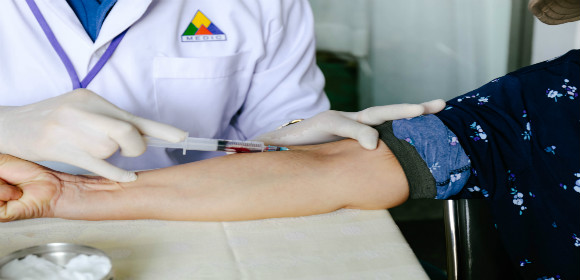9+ Clinical Research Ethics Examples
New York, 1996—A college sophomore died after participating in a university experiment. For $150, Nicole Wan volunteered for a study on the relationship of lung cancer and air pollution where she underwent bronchoscopy. However, the researchers did more than what the girl consented. This move led to complications that ultimately killed her two days later. In the absence of strict implementation of clinical research ethics, Wan will just be among the lives lost to research misconduct.
Must tragedies always be the twisted catalyst for positive amendments? It’s like we are waiting for the other shoe to fall before we start to see the gaping crevices in our current practices. Scientists are not plotting world domination and humanity’s doom in their dark underground laboratories. Research initiatives generally come from the best intentions. Clinical research is an alloy of medical practice and the academe that is bent on improving public health.
For us to realize that goal, researchers need the cooperation of the researches’ beneficiaries: us. The dark side of medical research comes from the exploitation of people in the name of science. Clinical research ethics are a set of guidelines that sprung from these tragedies, in a conscious effort to prevent the other shoe from dropping.
Thorns of a Rose
If we base right from the infinite permutations of wrong, we will not have a definite characterization of what is right. Therefore, we should set a guideline of what qualifies as right and ethical in the realms of clinical research. When something does not follow the rule, then it is considered wrong. The rules are arbitrary in some cases because an action may not constitute an offense during. Still, it becomes a violation when the research inflicts damage, or the researchers intentionally ignore red flags.
Ethical demarcation
Ethics, per se, is universal and hazes the distinctions of human law of right from wrong. What right is right, and what wrong is wrong. You might say that doing the wrong thing for the right reason will make it right. However, you are still doing something wrong, regardless of the reason. Ethical research conduct includes the honest reporting of data to respect the value of your study’s participants.
Pillars of Clinical Research Ethics
After a series of human rights violations and not a precedent to hold the culprits responsible, the world saw the urgency in establishing measures to avoid similar tragedies. The following are among the guidelines that remodeled medical research ethics. This list doesn’t intend to discredit the contribution of other rules to modern clinical research conduct. Included here are just a few of the landmark rules.
Nuremberg Code: The human subjects must voluntarily participate in a study and have the full autonomy to decide for themselves. The research should produce significant results that can’t be obtained by other, less invasive means. Harm on the subjects must be at a minimum to none. And the unavoidable risks in the study should never be more than its potential good.
Declaration of Helsinki: The World Medical Association instituted the guidelines for medical research that safeguard human participants. The research process, along with the protocols and conduct, must abide by and adhere to the scientific principles and the law. Before human tests are done, the research should be done on animals and in the laboratory first.
Belmont Report: This reiterates the need for explicit approval before participating in the study and the respect for the rights of a person. The scientists have to make sure that their research should have significant social and clinical value. We should also make sure that the potential harm we impose on the subjects is in a reasonable ratio with the benefits that the study can provide.
US Common Rule: All the United States government-funded research abide by this rule of ethics on behavioral and biomedical research that uses human subjects. Schools and universities also uphold this standard and require researchers to comply with it. The rule includes guidelines on obtaining informed consent, protection of the vulnerable sectors of society, as well as how the Institutional Review Board (IRB) regulates research.
Clinical Research Ethics Examples
The following PDF files are articles and guides regarding the proper and ethical code of conduct of medical research, from the handling of personal information to what qualifies as ethical in the entire research design.
1. Research Ethics Article

researchgate.net
2. Clinical Research Ethics Guide
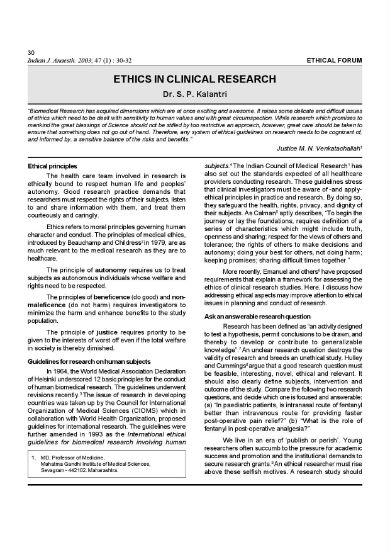
pdfs.semanticscholar.org
3. Clinical Research Handbook
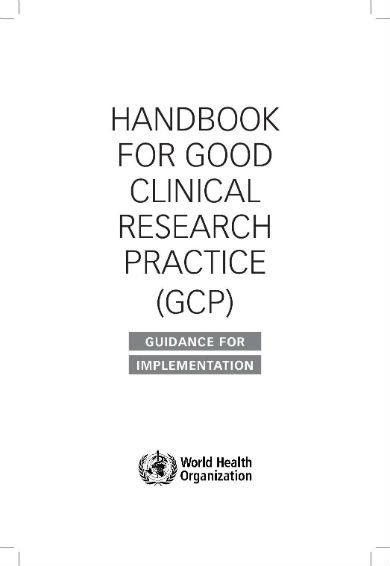
who.int
4. Clinical Research Ethics Report
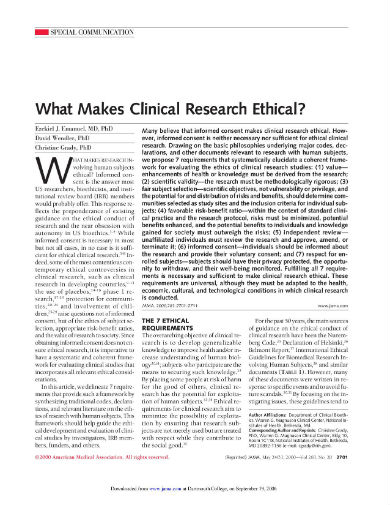
dartmouth.edu
5. IRB Guidelines Report
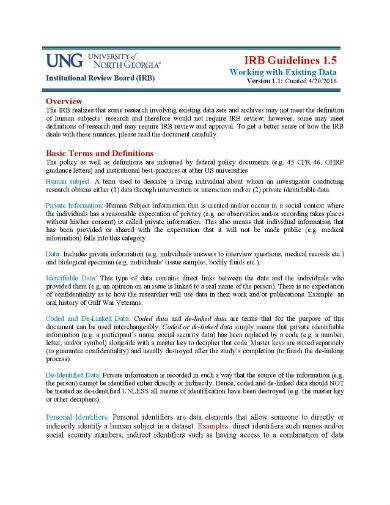
ung.edu
6. Guidance for Student Research
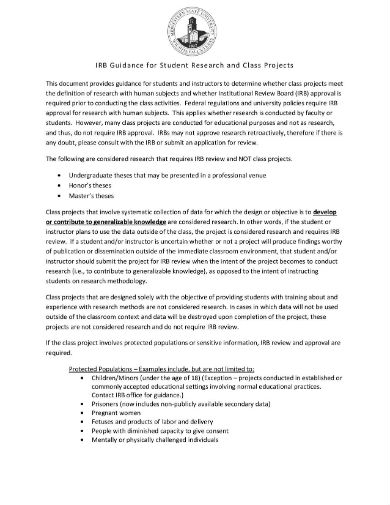
msutexas.edu
7. Guide to Research Ethics
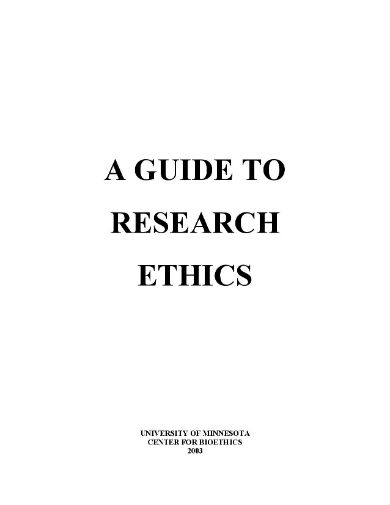
ahc.umn.edu
8. Clinical Trials Guide
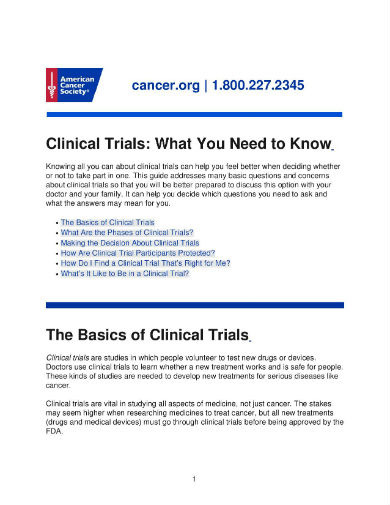
cancer.org
9. Scientific Research Ethics

rand.org
10. Handling Information Guide
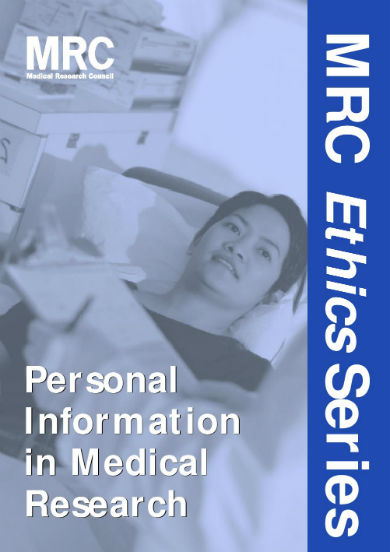
mrc.ukri.org
Guidelines on Clinical Research Ethics
As scientists, we are responsible for the consequences of our studies. During our experiments, we have the dominant hand over the participants who are under our care. We should always put first the welfare of the volunteers before our personal interest. The following are reminders for researchers when they are conducting their medical research. The content is based largely on the National Institutes of Health’s website.
1. Research’s Significance
You are placing someone at potential risk for your research endeavor at the promise of potential good. Therefore, your move should be justified by relevant research questions. The justification comes when the entire research will produce findings that are important to the advancement of medicine. The value of your research stems from the use society gets from knowing and applying the results. Improving health and healthcare, after all, is the goal of clinical research.
2. Non-discrimination
Science is amoral. It should never be used as an excuse to inflict any damage to any person in the guise of doing something good. It is not an avenue to forward one’s biased and faulty principles, like his or her archaic beliefs of sex, race, and color supremacy. Non-discrimination should apply to choosing the participants and the beneficiaries of the study. Researchers should have a scientific and relevant reason in deciding their sampling frame. As per principle, the subjects and the beneficiaries should share the benefits and burdens of the research.
3. Do No Harm
Or at least the benefits of participation in the study outweigh the risks. Risk is always present in the pursuit of something new. That doesn’t stop our goal of a better quality of life. These risks can come in the form of minor, temporary discomfort to crippling consequences in the emotional, social, and economic aspects of a person. Researchers should mitigate, by all means necessary, the harm their study posed on the human subjects. Regardless of any cash or kind offer that we made in exchange for their participation, no person should suffer avoidable harm as a consequence.
4. Informed Explicit Assent
The volunteers should be fully informed about the consequences of their participation, including the risks and benefits. Researchers should not withhold information that might influence participation. It is important that the volunteers are competent to make the decision. This means that they are legally able and in the right mind to decide. For pediatric studies, the parents’ consent is necessary. The medical research participants should be part of the study in their own volition, not under duress or coercive influence. The consent should be informed and explicit.
5. Respect for Person
We should respect the person’s autonomy, rights, and liberty. In line with this, the researchers should explicitly inform the volunteers that they can freely withdraw at any time from the study should they feel uncomfortable. Aside from that, researchers are well to know that the identifiable data entrusted into them should remain confidential. In the event that personal information has to be declared for a scientific purpose, the scientists are responsible for making such a profile untraceable to the owner. We should also monitor and update the volunteers of progress related to the study.
Most of our existing rules and regulations on medical research stemmed from the adverse effects of the lack of guidelines. Perhaps instead of just mourning over what could have been, we can start proactively advocating ethical research conduct in all areas involved. Avoidable losses being the precursor for the needed change in practices should not be the norm. The tenet of clinical research is a scientific and mass-oriented improvement of public health. Isn’t it just right that we achieve a noble end with benevolent means?


